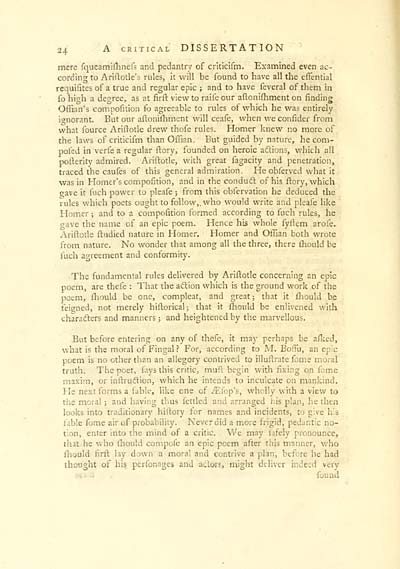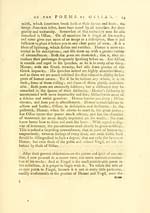Download files
Complete book:
Individual page:
Thumbnail gallery: Grid view | List view

24 A CRITICAL DISSERTATION
mere rqucamiflinefs and pedantry of crlticifm. Examined even ac--
cording to Ariftotle's rules, it will be found to have all the effential
requifites of a true and regular epic ; and to have feveral of them in
fo high a degree, as at firft view to raife our aftonifhment on finding
Oflian's compofition fo agreeable to rules of which he was entirely
ignorant. But our aftonifliment will ceafe, when we confider from
what fource Ariflotle drew thofe rules. Homer knew no more of
the laws of criticifm than Offian. But guided by nature, he com-
pofed in verfe a regular ftory, founded on heroic adions, which all
porterity admired. Ariftotle, with great fagacity and penetration,
traced the caufes of this general admiration. He obferved what it
was in Plomer's compofition, and in the condudt of his frory, which
gave it fuch power to pleafe ; from this obfervation he deduced the
rules which poets ought to follow,, who would write and pleafe like
Homer ; and to a compofition formed according to fuch rules, he
gave the name of an epic poem. Hence his whole fyilem arofe.
Ariftotle fhudied nature in Homer. Homer and Offian both wrote
from nature. No wonder that among all the three, there fliould be
fuch agreement and conformity.
The fundamental rules delivered by Ariftotle concerning an epic
poem, are thefe : That the adlion which is the ground work of the
poem, fhould be one, compleat, and great; that it fliould be
feigned, not merely hifhorical; that it fliould be enlivened with
charadlers and manners ; and heightened by the marvellous.
But before entering on any of thefe, it may perhaps be aflicd,
what is the moral of Fingal ? For, according to M. Bol^u, an epic
poem is no other than an allegory contrived to illuflrate fome moral
truth. The poet, fays this critic, muf'c begin with fixing on fome
maxim, or inllrudtion, which he intends to inculcate on mankind.
He next forms a fable, like cne of JEiop's, wholly with a view to
the moral ; and having thus fettled and arranged f;is plan, Jie then
looks into traditionary hiftory for names and incidents, to give his
fable fome air of probability. Never did a more frigid, pedantic no-
tion, enter into the mind of a critic. We may fafely pronounce,
that he who fliould compofe an epic poem after this manner, who
fliould firft lay down a moral and contrive a plan, before he had
thought of his perfonages and adors, might deliver indeed very
vi-i J found
mere rqucamiflinefs and pedantry of crlticifm. Examined even ac--
cording to Ariftotle's rules, it will be found to have all the effential
requifites of a true and regular epic ; and to have feveral of them in
fo high a degree, as at firft view to raife our aftonifhment on finding
Oflian's compofition fo agreeable to rules of which he was entirely
ignorant. But our aftonifliment will ceafe, when we confider from
what fource Ariflotle drew thofe rules. Homer knew no more of
the laws of criticifm than Offian. But guided by nature, he com-
pofed in verfe a regular ftory, founded on heroic adions, which all
porterity admired. Ariftotle, with great fagacity and penetration,
traced the caufes of this general admiration. He obferved what it
was in Plomer's compofition, and in the condudt of his frory, which
gave it fuch power to pleafe ; from this obfervation he deduced the
rules which poets ought to follow,, who would write and pleafe like
Homer ; and to a compofition formed according to fuch rules, he
gave the name of an epic poem. Hence his whole fyilem arofe.
Ariftotle fhudied nature in Homer. Homer and Offian both wrote
from nature. No wonder that among all the three, there fliould be
fuch agreement and conformity.
The fundamental rules delivered by Ariftotle concerning an epic
poem, are thefe : That the adlion which is the ground work of the
poem, fhould be one, compleat, and great; that it fliould be
feigned, not merely hifhorical; that it fliould be enlivened with
charadlers and manners ; and heightened by the marvellous.
But before entering on any of thefe, it may perhaps be aflicd,
what is the moral of Fingal ? For, according to M. Bol^u, an epic
poem is no other than an allegory contrived to illuflrate fome moral
truth. The poet, fays this critic, muf'c begin with fixing on fome
maxim, or inllrudtion, which he intends to inculcate on mankind.
He next forms a fable, like cne of JEiop's, wholly with a view to
the moral ; and having thus fettled and arranged f;is plan, Jie then
looks into traditionary hiftory for names and incidents, to give his
fable fome air of probability. Never did a more frigid, pedantic no-
tion, enter into the mind of a critic. We may fafely pronounce,
that he who fliould compofe an epic poem after this manner, who
fliould firft lay down a moral and contrive a plan, before he had
thought of his perfonages and adors, might deliver indeed very
vi-i J found
Set display mode to: Large image | Transcription
Images and transcriptions on this page, including medium image downloads, may be used under the Creative Commons Attribution 4.0 International Licence unless otherwise stated. ![]()
| Early Gaelic Book Collections > Ossian Collection > Critical dissertation on the poems of Ossian, the son of Fingal > (70) |
|---|
| Permanent URL | https://digital.nls.uk/77432363 |
|---|
| Description | Selected books from the Ossian Collection of 327 volumes, originally assembled by J. Norman Methven of Perth. Different editions and translations of James MacPherson's epic poem 'Ossian', some with a map of the 'Kingdom of Connor'. Also secondary material relating to Ossianic poetry and the Ossian controversy. |
|---|
| Description | Selected items from five 'Special and Named Printed Collections'. Includes books in Gaelic and other Celtic languages, works about the Gaels, their languages, literature, culture and history. |
|---|

